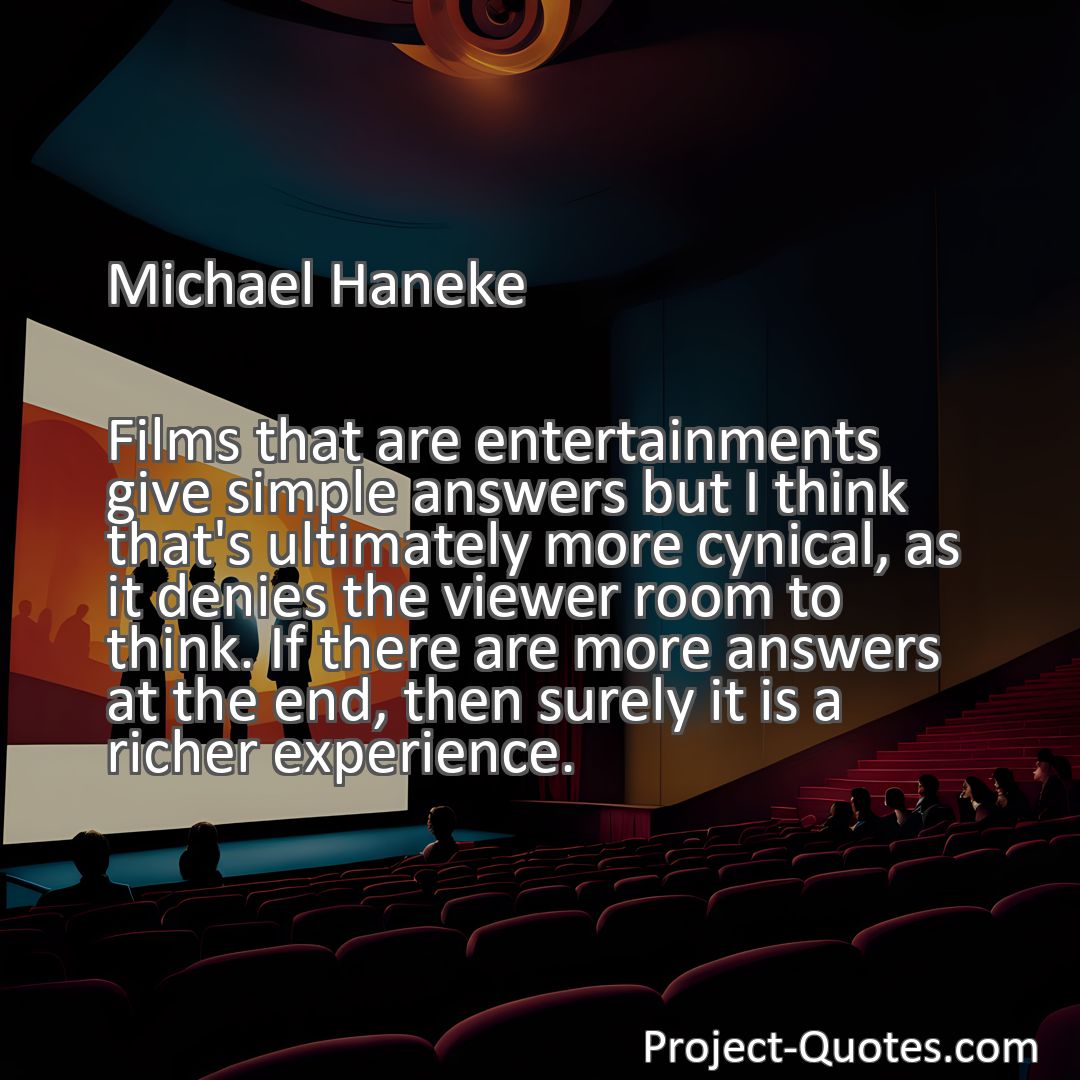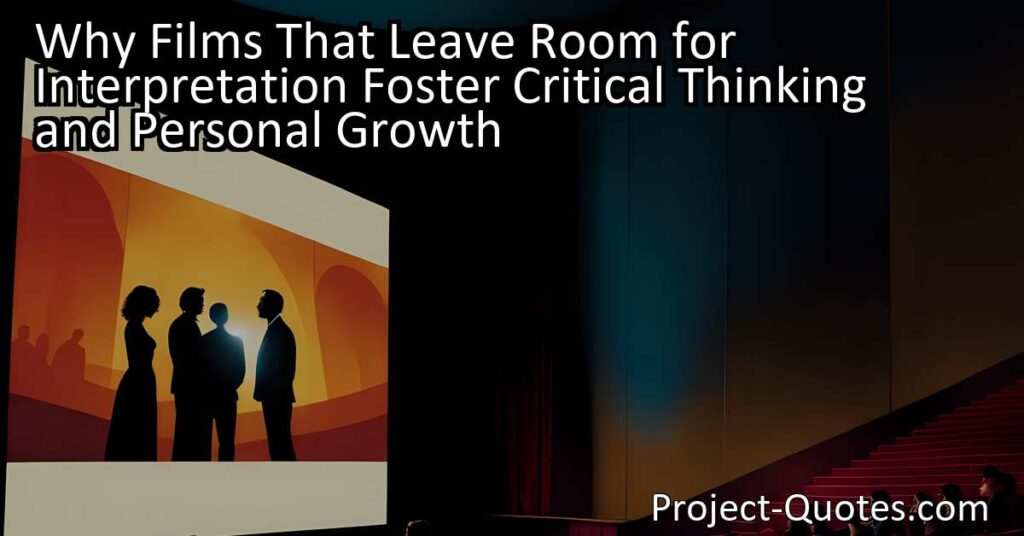Films that are entertainments give simple answers but I think that’s ultimately more cynical, as it denies the viewer room to think. If there are more answers at the end, then surely it is a richer experience.
Michael Haneke
Films that provide simple answers may unintentionally discourage critical thinking by limiting viewers’ capacity to engage in deep reflection and exploration of the film’s themes. By spoon-feeding conclusions, these films run the risk of perpetuating narrow views and reinforcing societal biases, hindering personal growth and intellectual stimulation. Michael Haneke argues that movies should leave room for interpretation and provoke meaningful discussions to foster critical thinking and a richer cinematic experience.
Table of Contents
- 1 Films that are entertainments give simple answers but I think that’s ultimately more cynical, as it denies the viewer room to think. If there are more answers at the end, then surely it is a richer experience.
- 2 Michael Haneke
- 3 Meaning of Quote – Films that are entertainments give simple answers but I think that’s ultimately more cynical, as it denies the viewer room to think. If there are more answers at the end, then surely it is a richer experience.
- 4 Freely Shareable Quote Image
- 5 Related
Meaning of Quote – Films that are entertainments give simple answers but I think that’s ultimately more cynical, as it denies the viewer room to think. If there are more answers at the end, then surely it is a richer experience.
Have you ever watched a movie that left you with more questions than answers? Well, acclaimed filmmaker Michael Haneke believes that such movies offer a richer and more fulfilling experience. In his quote, Haneke points out that films categorized as entertainments often provide simple answers, limiting the viewer’s capacity to think critically. This can be seen as a cynical approach, as it denies the audience the opportunity to engage in deep reflection and exploration of the film’s themes. According to Haneke, a truly enriching cinematic experience should leave room for multiple interpretations and provoke meaningful discussions.
When considering Haneke’s perspective, it’s important to examine the impact that films have on our lives. Movies, as a form of storytelling, have the power to shape our perceptions, challenge our beliefs, and ignite our imagination. They have the ability to transport us to different worlds, expose us to diverse perspectives, and offer us glimpses into the human condition. However, when films provide simplistic answers, they risk undermining the potential for personal growth and critical thinking.
In today’s fast-paced and instant gratification-driven society, it’s easy to see why many filmmakers opt for providing straightforward resolutions in their movies. These films, often labeled as entertainment, tend to follow a formulaic approach. They present clear-cut heroes and villains, predictable storylines, and neatly tied-up endings. While they may provide momentary enjoyment and temporary escape from reality, they often lack depth and fail to leave a lasting impact.
On the other hand, films that leave room for interpretation allow viewers to actively engage with the material. By presenting complex characters, thought-provoking narratives, and ambiguous endings, these movies encourage audiences to think critically about the messages being conveyed. They challenge us to reflect on our own beliefs, values, and assumptions, opening the door to self-discovery and personal growth.
One of the most fascinating aspects of movies is their ability to evoke emotions and spark conversations. When films offer multiple answers at the end, they become catalysts for discussions that extend beyond the theater. Engaging in debates and exchanging thoughts and ideas about different interpretations of the film can be both intellectually stimulating and socially enriching. These conversations not only deepen our understanding of the movie but also foster empathy, tolerance, and open-mindedness by exposing us to diverse perspectives.
Furthermore, leaving room for interpretation creates space for individual creativity and imagination. When a film’s conclusion is open-ended or ambiguous, it allows viewers to project their own experiences, beliefs, and emotions onto the story. This personal connection with the film enables a deeper level of engagement and emotional investment, making the cinematic experience more meaningful and memorable.
In contrast, films that provide simple answers tend to rely on preconceived notions and stereotypes, limiting their ability to resonate with a diverse audience. By spoon-feeding conclusions, these films run the risk of perpetuating narrow views and reinforcing societal biases. In essence, they may unintentionally discourage critical thinking and promote a passive approach to consuming media.
It is worth noting that Haneke’s quote does not dismiss the value of entertainment in films. After all, entertainment plays a significant role in enhancing our enjoyment of movies. However, he argues that true artistic merit lies in going beyond mere entertainment and offering audiences something more profound and intellectually stimulating.
In conclusion, Michael Haneke’s quote emphasizes the importance of films that do not provide simple answers. Instead, he believes that movies that leave room for interpretation and contemplation offer a richer and more fulfilling experience. These films challenge viewers to think critically, engage in meaningful discussions, and explore different perspectives. By resisting the urge to provide easy resolutions, movies can become powerful tools for self-reflection, personal growth, and social empathy. So the next time you sit down to watch a film, consider the questions it raises, the multiple answers it presents, and the impact it can have on your life.
I hope this quote inspired image brings you hope and peace. Share it with someone who needs it today!


